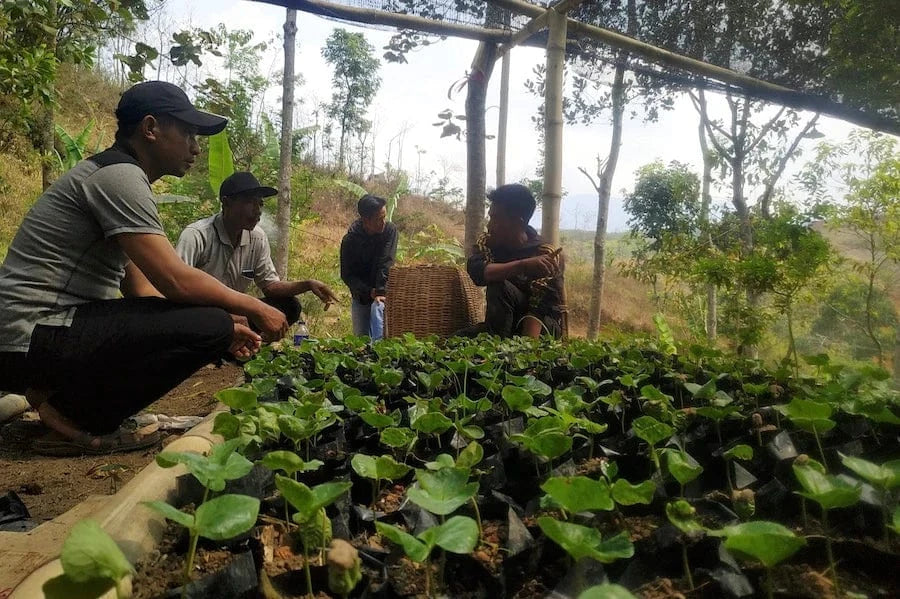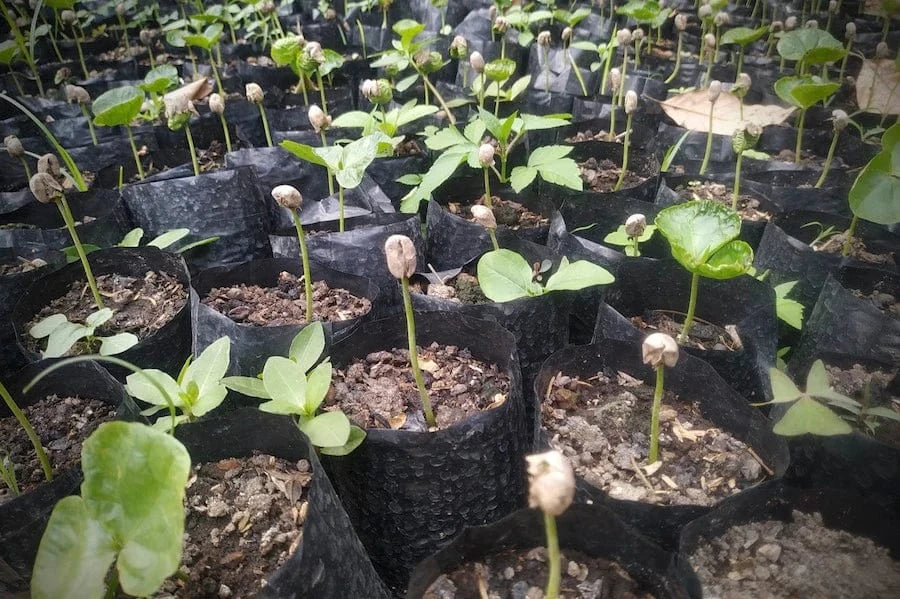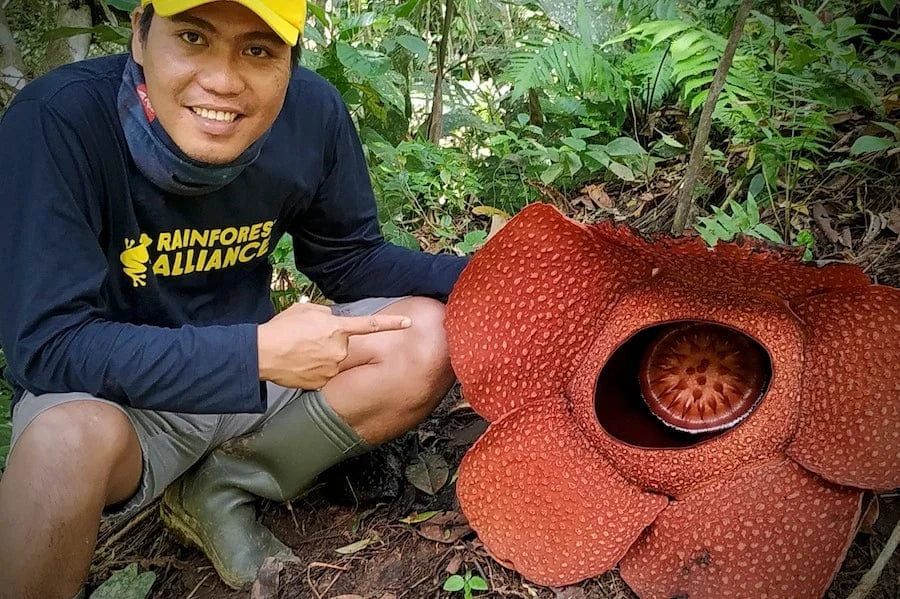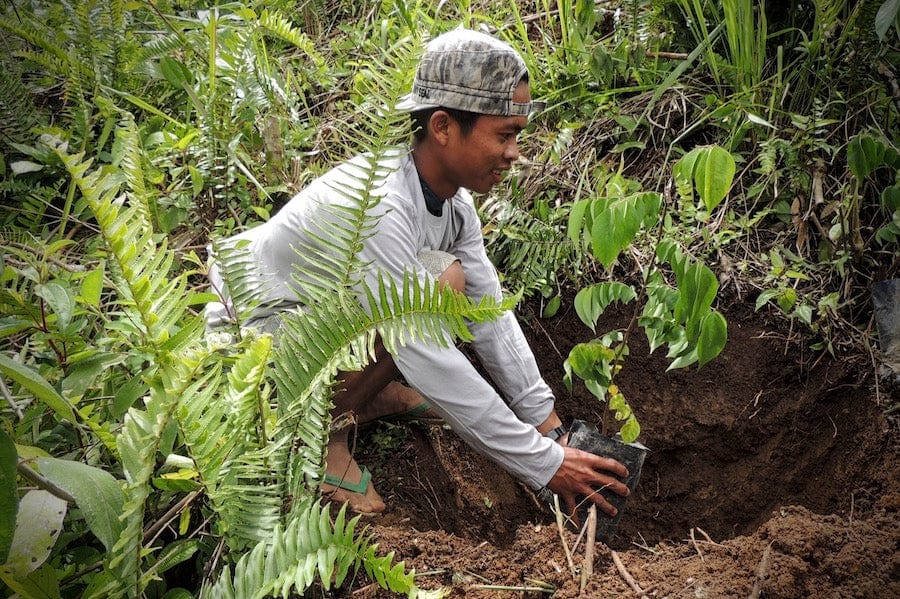
Get news, updates, & event Info delivered right to your inbox:
124,041 Trees Planted in Sumatra to Restore Rainforests, Protect Wildlife, and Improve Livelihoods
As the global demand for commodities like coffee grows in both established consumer markets and developing economies, forests are on the front lines of change. In tropical regions like Sumatra, small scale farmers face the difficult choice between clearing land to increase crop yield and profit and conserving forests while limiting their own livelihoods. However, this is often a false choice.
In the process of converting forests to farmland, erosion strips away the soil that trees once held in place. As soil health is degraded, what were meant to be gains in productivity become losses as erosion makes newly cleared lands unproductive. In turn, farmers cannot earn decent wages, pushing them to clear more forests in a desperate attempt to further expand cultivation, all of which negatively impacts nature, wildlife and the community in a destructive cycle.
In Sumatra, this process has been playing out for decades with disastrous results, pushing both people and wildlife to the brink. However, some farmers are embracing tree planting as a new way forward by integrating shade-grown coffee with agroforestry. By spacing trees throughout their plantations, farmers can improve soil fertility and crop yield while sustainably harvesting fruit and non-timber forest products. In the process, pressure on surrounding protected areas is reduced — and local biodiversity is enhanced within farms.
Healthy Forests Equal Healthy Farms
To help champion these solutions, One Tree Planted has teamed up with the Rainforest Alliance to plant 124,041 trees in Lampung Province in South Sumatra, Indonesia. Led by more than 1,158 farmers, staff and volunteers, tree planting is restoring over 1,800 hectares of degraded and deforested lands while empowering farmers as agents of change in their communities.
Lampung Province’s lush tropical climate and hilly terrain make it a premier coffee growing region, as well as a haven for wildlife. Many farms here border Bukit Barisan Selatan National Park (BBSNP), one of Indonesia's most important protected areas. Forest fires damaged some of these planting sites, but restoration is helping to regenerate the landscape, prevent soil erosion, and protect water supplies that will benefit local communities in the area.
Many of the trees planted were a mix of tropical fruit trees such as Avocado, Durian and Mangosteen, and species with economic value as non-timber forest products like Bamboo. As the trees grow, they will produce fruits and other products that farmers can sell to support their families in a sustainable way, buffering against unpredictable crop cycles and fluctuating commodity markets. In this way, tree planting is diversifying the local farm economy, while providing numerous environmental benefits.



Improving the Coffee Supply Chain
Coffee and a plethora of other crops have been produced in Lampung for generations. So any attempt to arrive at a positive outcome for conservation and better land management through tree planting begins with the farmers.
The Rainforest Alliance recognizes this, and for several years has been collaborating with local Gapoktan or ‘farmers group associations’ in Lampung to better understand the economic, social, and political dynamics that shape land use in the region. Partnerships forged with local farmers groups, Forest Management Units (FMUs) and other authorities are creating much needed coordination.
As there are approximately 40,000 families whose livelihoods depend on the forests in the FMUs that buffer the park, consensus on the many benefits of the project is crucial. By empowering local people and farmers as stakeholders in restoration, this tree planting is a catalyst for change, helping local people and safeguarding the region’s irreplaceable biodiversity.

Protecting Sumatra’s Last Rainforests
Sumatra, together with nearby Borneo, contains some of the last and largest remnants of Indonesia’s spectacular forests, the third largest rainforests in the world. Importantly, Bukit Barisan Selatan National Park (BBSNP) is one of only three sites left on the island recognized by UNESCO to represent the ‘Tropical Rainforest Heritage of Sumatra’. These sites hold the greatest potential for the long-term conservation of the distinctive and diverse biota of Sumatra, including numerous endangered species. In other words, these natural refuges are living arks of biodiversity.
It is estimated that the “Tropical Rainforest Heritage of Sumatra” sites hold 10,000 species of plants, including oddities like the enormous Rafflesia, the largest flower on Earth. Over 200 mammal species have also been documented, some 580 different birds and countless other life forms. Many of these species are endemic to the area. Despite this, these ancient forests have been cleared at an alarming rate in the past few decades to make way for agricultural expansion, paper pulp and oil palm plantations.
Working to restore healthy, intact forests in the buffer zone surrounding Bukit Barisan Selatan National Park (BBSNP) will help safeguard the park. Native trees planted as part of this project will provide habitat and food resources for a variety of wildlife ranging from tarsiers to endangered birdwing butterflies. They will also contribute to protecting habitats for larger animals in the landscape including critically endangered Sumatran orangutans, tigers, elephants and some of the last remaining Sumatran rhinos left on Earth.
Coordinated Solutions to Complex Problems
Coming together to plant trees is one of the most effective ways to help restore forests, protect wildlife, and create smart market linkages between farmers and people around the world. Just as global issues impact on the local, complex problems like deforestation require coordinated solutions across many stakeholder groups. However, sometimes the first step towards positive change can be as simple as planting a tree.
We are incredibly grateful to work with amazing people and partners like The Rainforest Alliance to find win-win solutions to benefit local communities and the environment. Our partnership now spans several countries in Latin America and Asia, with many more reforestation initiatives in the works. Support reforestation projects in areas like Asia!
Get news, updates, & event Info delivered right to your inbox:
Related Posts
Sustainable Diet Tips: How to Eat Healthy While Protecting the Planet
13/01/2026 by Meaghan Weeden
Agroforestry Explained: Principles, Benefits, and Case Studies
08/01/2026 by Meaghan Weeden
Plant Your Resolution: Making a Global Impact With The Grove
01/01/2026 by One Tree Planted
Popular On One Tree Planted
How to Reduce Waste: 21 Practical Zero Waste Tips for Everyday Living
23/12/2025 by Meaghan Weeden
Inspirational Quotes About Trees
16/12/2025 by Meaghan Weeden
The 9 Oldest, Tallest, and Biggest Trees in the World
11/12/2025 by One Tree Planted
Fundraising Disclosures

Be Part of the Restoration Movement
The Grove is more than just a monthly giving program: it's a vibrant community of individuals who are dedicated to reforestation and environmental restoration on a global scale.





